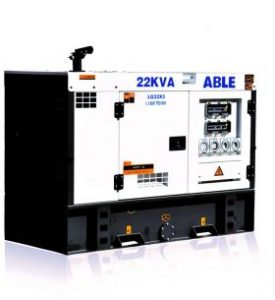Our industries only run as well as our power supply. In fact, even our home lives can just about collapse if there’s a power outage over a longer period of time. The situation is worse still for hospitals and health centers when the risks are higher.
 Electricity fails more during the summer in tropical countries and in the winter around the western world where there is extensive demand. But most times, we don’t even realize when the electricity comes and goes if there are efficient generators in use.
Electricity fails more during the summer in tropical countries and in the winter around the western world where there is extensive demand. But most times, we don’t even realize when the electricity comes and goes if there are efficient generators in use.
However, having poor quality or inappropriate generators can cause more trouble than it’s worth. So, it’s important to choose the right generator for your needs and budget.
You can buy your generator in-store or order them online from reliable e-commerce sites like Able Sales. But, to make sure that you’re spending your hard-earned money on the perfect generator, you’ll need to consider a few aspects:
Size
Size does matter if you’re looking for a generator. Be well aware of your power requirements and buy a generator accordingly. Besides uninterrupted operations, there are other benefits to choosing the correct generator size:
- Ample load capacity
- Fewer maintenance issues
- Better performance
- Safe to work
- Greater longevity
However, there are some generators that come with a digital automatic voltage regulator (D-AVR), to handle the high currents involved with starting transformers and motors, which allows operators to downsize the size of the generator.
There are also other effective systems like, ‘Close Before Excitation’. With these advanced technologies, you can now avoid buying oversized generators. This means you’ll save a good amount of fuel and maintenance costs and your generator will last longer.
If you’re buying the generator for industrial purposes, here are some tips to help you decide the perfect generator size:
- Make a list of the equipment the generator will need to perform
- Find out its wattage during startup and running
- Figure out how long it has to run continuously to power the site equipment.
Fuel
Thankfully, generators consume much less fuel than they used to. However, this may not be the case for every generator. Since fuel can be expensive, ensure that you buy an energy-efficient one. Talk to three or four manufacturers to compare the fuel consumption rates of their products.Generators can be run on natural gas, propane, or diesel. Go for the option that’s easily accessible and the most cost-effective for you.
Modular Capability
Ask the generator manufacturer about the steps it would need to take to match one generator with others, such as a modular power plant set up, and how long the process would take. Make sure the generator is equipped with this capability as standard.
Most generators usually take 10 minutes to run this process. But, this is not the case with every generator; some may be weaker. That’s why it’s smart to inquire about it carefully before investing in your generator to avoid future disappointment.
Physical Size and Transportation
Find out whether the units can be loaded on a truck and look for lifting eyes and forklift slots. If you’re planning to use multiple generators, consider stacking the units on top of each other so you can minimize your carbon footprint while saving space.
Pick a generator that’s accurate in size, since they’re the best in service. It’s smart to seek advice from experts and stay updated on the new designs and technologies so that you can go for the latest facilities when buying a new generator.
Generator Installation
Some of you may have a company name in mind when deciding on a generator, or you may want to go for the company you’ve been referred to; it’s all up to you.
But, make sure that the electrician you’re hiring to install your generator has a proper license to do his work and is from a reputable company with plenty of work experience.
Enclosure Type
In the case of outdoor and rooftop installations, always follow the safety guidelines. Find out if there’s a local noise ordinance in your area. Choose a generator with the proper enclosure type according to your noise requirements.
The Voltage Requirement
Learn about the voltage requirement of your area. If you’re unsure, ask your electrician. Then, choose your generator accordingly.
Accessory Requirements
Different generators have different accessories. Your typical residential generator may come with an optional remote annunciator panel that can provide you with the status of the generator. Cold weather kits and remote monitoring are also available with some residential generators.
So, if you’re buying the generator for residential or light commercial purposes, opt for the system you need.
The number of available options is much greater for industrial systems, which can include an expanded list of communication options, alternator strip heaters enclosure lighting, load centers, etc.
Warranty
Check the product warranty of the generator you’re considering. As per standard, residential generator systems usually offer one to five years of warranty on their product, depending on the type of the generator.
On the other hand, a commercial generator may come with a warranty ranging from two to five years, while an industrial generator typically offers a one or two year warranty with optional upgrades.
Understand this warranty duration and find out the upgrade costs if you want to invest in extended coverage. Finally, to Purchase or Rent?
If it’s for residential use, then buying the generator is the ideal option. But if you’re buying it for industrial use, then it depends on a range of factors, such as whether it’s more cost-effective, how long you need it for, and if you have enough space to store your unit(s) when not in use.
Consider all of these aspects carefully, then follow the tips to choose your perfect generator. Good luck!






